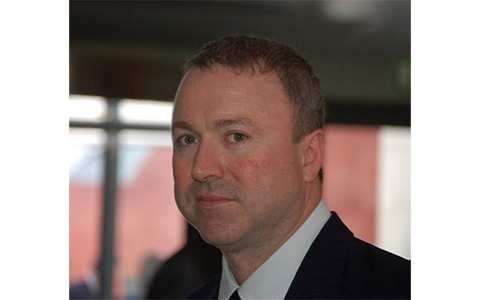This weekend I will...
I'll get up early. Hopefully it'll be sunny and I'll go for a long walk along the beautiful beach road near where I live. I will, as ever, look at the people doing yoga, thinking I should really do some yoga and do a little bit of stretching to make myself feel a little less unhealthy.
I always find walking along the sea that my brain and legs seem intricately connected. When I walk, I think, so I tend to listen to a few podcasts and think over some of the things I've been pondering over the week.
In the past few years I’ve become addicted to padel – not paddle boarding, padel tennis. It's huge in Portugal, I think it’s just kicking off in Australia. It really is a nice game for, as I like to put it, ‘the older elite athlete’. It's very social and almost everybody I know now plays and we usually play a couple of hours of that.
And my daughter went back to university in the UK last week and my son’s going back on Sunday so we’ll have those mixed emotions being pleased to get the house back but also understand that while it’s going to be a little less stressful without them it will be a little more lonely.
I wish I’d never…
There was a brief period in my youth where I was smoking and that’s something I regret. But I’m not really a ‘never’ person. I think in life you learn most from the things you screw up, and I’ve screwed up lots of things in my time. Certainly I’m a better manager now, having made almost every mistake you can make, but they are the things I have learned most from.
And this idea that life’s about the journey, not the destination. Especially now I’m older, I realise there were times that I had wonderful opportunities and experiences but I was worried or anxious about the future. I wish I’d spent more time enjoying those things in the moment.
I'll never forget...
I’m a dad so I’ll never forget first seeing both my kids and that feeling of complete and unconditional love and at the same time panic, fear and that I've been given a task I’m completely unequipped for with no manual or instructions.
I'm a foodie. I love food, Asian food particularly, and a more silly thing I remember is when I was 14 or 15, a friend of mine introduced me to Chinese take away. My parents never ate out and the food culture was completely different then and I remember being absolutely amazed by the concept of Asian food, and particular spring rolls, which I’d never come across.
I'd originally planned to work...
As a kid I was obsessed with animals. As I was getting a little bit older, I did a photography course and I was quite good at photography. In fact, I’d been offered a job as an apprentice photographer, but went to university instead. When I finished university I briefly combined both because I had a brief spell of working with a monkey on Brighton Beach, taking pictures of tourists, which was morally dubious and financially unrewarding. That was a different time.
If I had more time, I'd...
I’d read more. I used to read all the time. Now I read factual things or short things or work things. And I'm constantly meaning to keep more in touch with old friends and colleagues. Personally, I’d like to sit under a palm tree somewhere and read a good book, and I often regret just not finding the time to call up people I haven’t spoken to in a long time.
For my next holiday...
I’m coming out early to Australia. I’ve been to Australia lots of times for work but I’ve never really been there as a tourist on holiday. So I’m going to take the opportunity to come out in November before I start in the Director role early next year, shadow the current director but also take time to chill out and get to know the place a little better. My partner and kids are coming over too and we’ll spend Christmas being tourists, really.
I can't get enough of...
Dark chocolate with nuts. I can't stop eating that at the moment. And I'm a bit obsessed with playing padel, I play far too much.
I’m most looking forward to…
Seeing both my kids graduate next year – seeing them through that bit of the journey will be a great relief – and this move to Australia.
I'm really terrible at...
I am quite neurodiverse; people used to call me other things. My ADHD means I’m terrible at sitting still, and my fear of being early and waiting means I’m always late. And even though my role is in the public realm, I’m actually quite poor at recognising faces and remembering names – which can be a source of embarrassment.
My goal for 2025 is...
It's simple and obvious. Both personally and professionally, I would like to make a successful transition to the NDRI Director role in Australia. I’d like by the end of the year that the people I’m working with don’t think they’ve made a horrible mistake bringing this guy over, and I’d like myself and my family to feel it has been a really positive and life-enhancing experience. If people are happy with me and I’m feeling happy with the move, I will be immensely pleased at the end of year.
Career wise, I’m most proud of...
That’s a hard one because most of the things that have gone well are team things. It’s a lot of people doing good things and working together, which is actually what I enjoy most.
But I think I can make a personal claim with my agency changing from being the EMCDDA to the EUDA, the European Drugs Agency. A lot of those formative ideas came from thinking that I have influential in over the past 10 or 15 years, so I’m quite pleased with that.
I’m also quite personally pleased with the conference that has become Lisbon Addictions. For years, I wanted to do a big European conference and everybody said we couldn’t do it, it wasn’t going to work. Then we launched the first conference and it was more successful than we thought. This year, we have 2000 people registered from 83 countries. I'm really pleased it’s become such a success.
The qualities I most value in my colleagues are...
I think first of all, generosity of spirit. It’s an adage, but it’s amazing what good teams of people can do if nobody cares who gets the credit. I like working with people who are generous with their time, enthused by the task and are more interested in getting things done than who gets the credit, because that’s when magical and fun things happen.
Also, as someone in the research evidence area, I think it’s important to be open minded. I value colleagues who aren’t set in their ways or thoughts and as the world and the evidence changes, they’re prepared to change the way they see the world. Being that flexible open minded thinker, but still with a critical perspective, that’s the kind of people I like working with.
The sector's biggest challenge going forward is...
Increasingly responding to the complexity and speed of change that we’re seeing, and that’s going to be important in terms of some of the opportunities coming up. Things like AI are going to make huge differences and some of the new technologies appear cheap and to offer huge benefits but at the same time that can be oversold and needs to be evaluated. Everyone’s keen on video conferencing, for example, and it can provide value but also comes with some real costs. So it’s recognising costs and benefits and how do we respond to new opportunities and challenges.
I’m quite influenced by the thinking coming out of things like the Global Commission on Evidence, so I also think we’re going to have to in the future work much more iteratively; working out how we make things incrementally better over time and how we use evidence a little bit differently. There aren’t evidence based interventions in my view, there’s how does the evidence inform different choices that we make in our work. That pushes you into working more with policy stakeholders but also affected communities and people with lived experience, and embracing co-production more than we have in the past.
My big hope for the drug and alcohol sector is...
Well, that’s easy and boring. The boring one, because I’ve been involved in service planning and delivery, is you want sufficient and sustainable funding. Without that, nothing else happens.
You need a policy framework that is both strategic and supportive, and sometimes that can be lacking. Drugs and alcohol tend to be put in a little silo, sometimes it’s fashionable and sometimes it’s not. Increasingly, and certainly what we’ve tried to do with our policy is to say these issues are inextricably linked with many or all of the key major policy concerns today. Whether it’s development in the Global South, mental health conditions, homelessness, even economic productivity, there’s always drugs and alcohol involved and you have to recognise how they are both influenced by and influence these broader policy areas.
And it would be nice to see drug and alcohol treatment more normalised. These sorts of problems can affect anyone and there is still far too much stigma in terms of help seeking. It should be more like going to your physician for any other health problem, and I’d like to see some of the barriers that exist today reduced over time.








